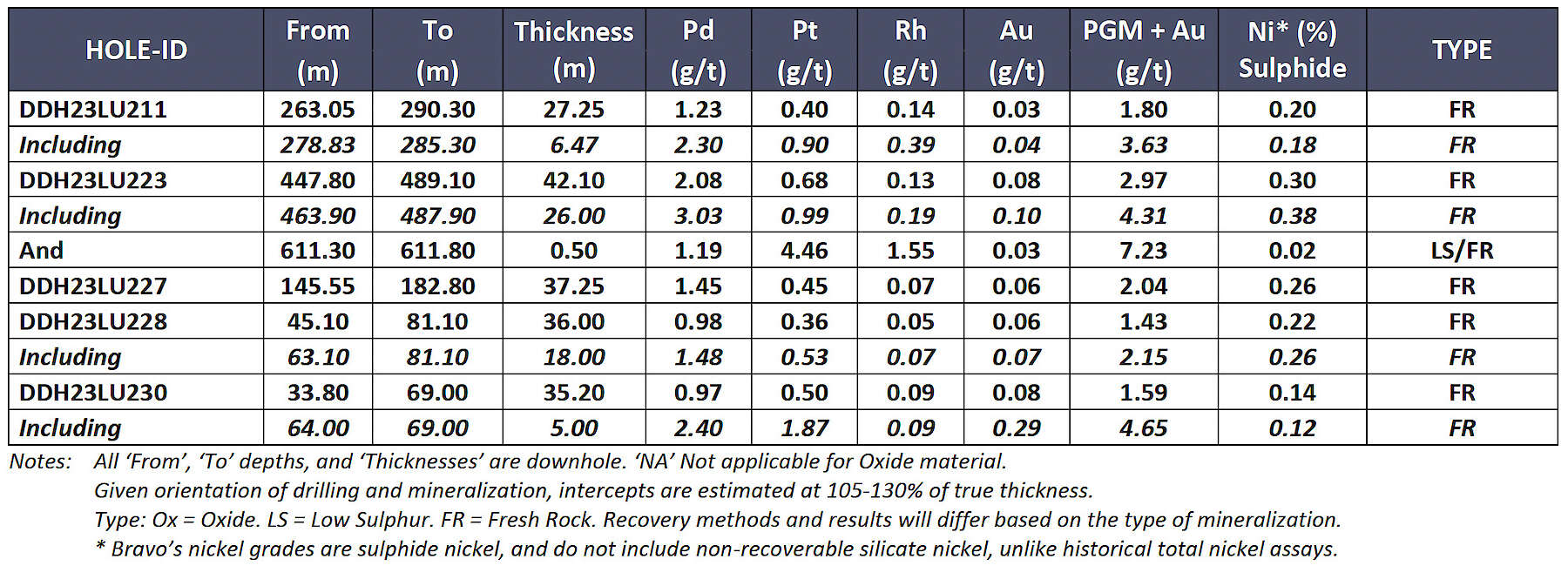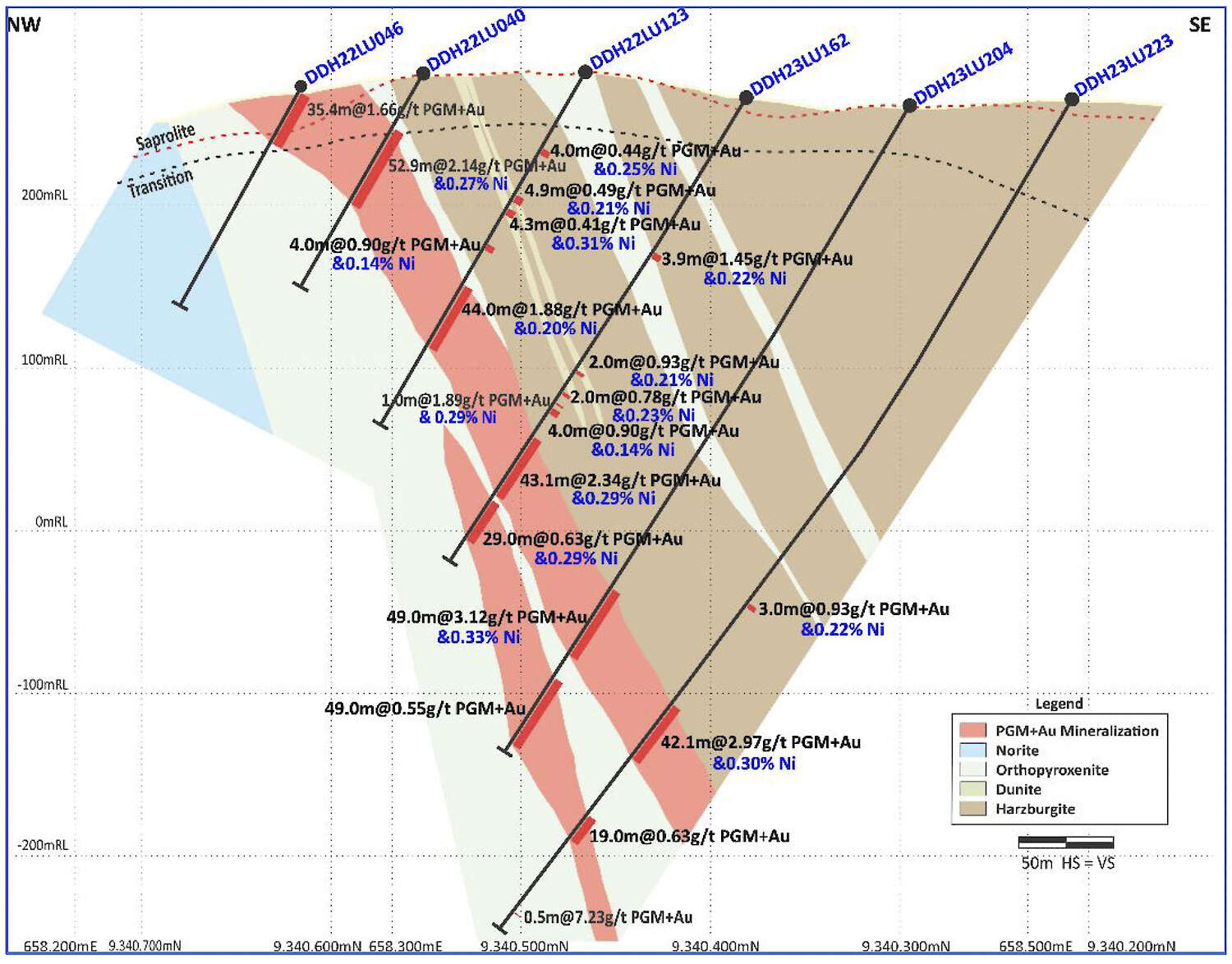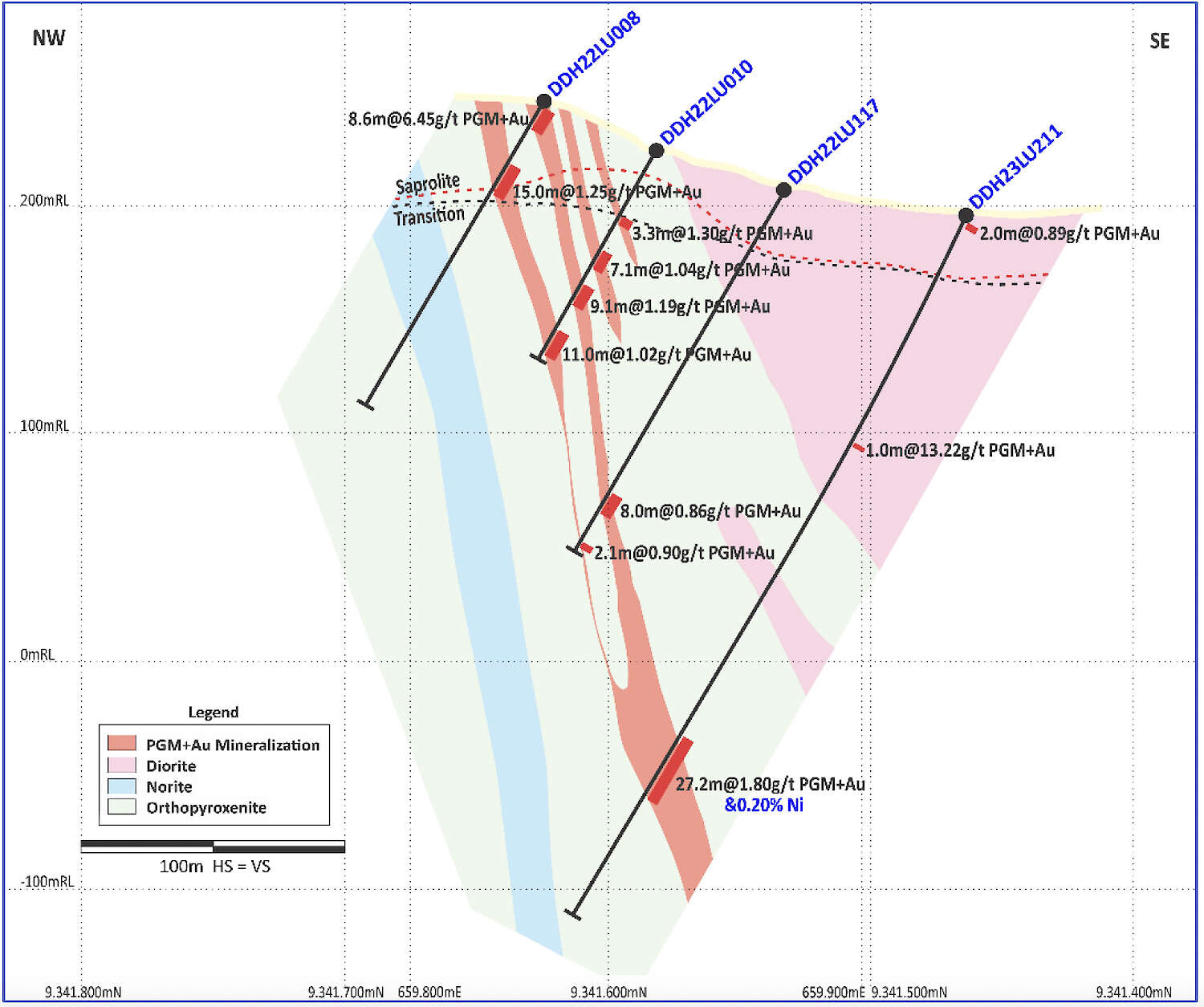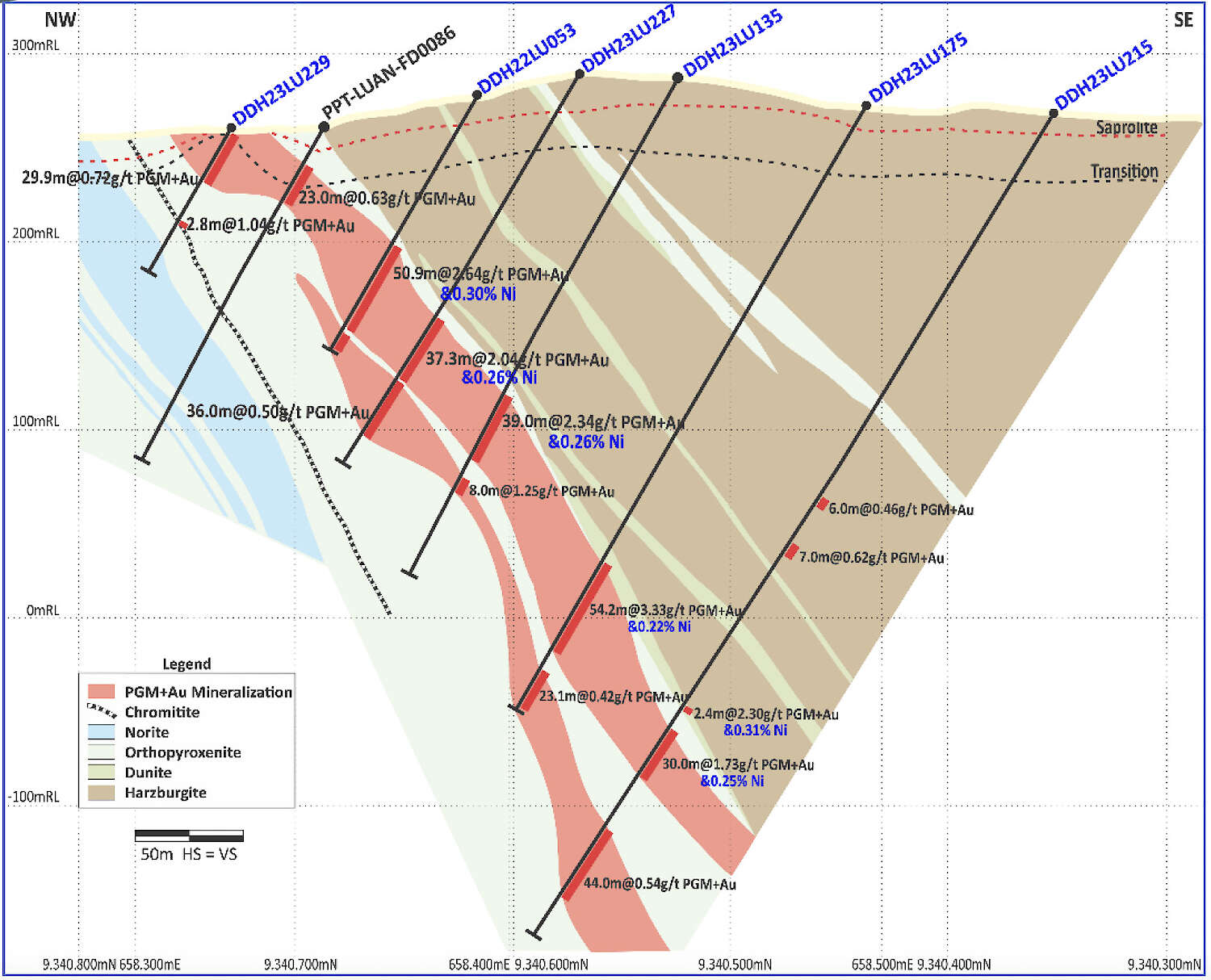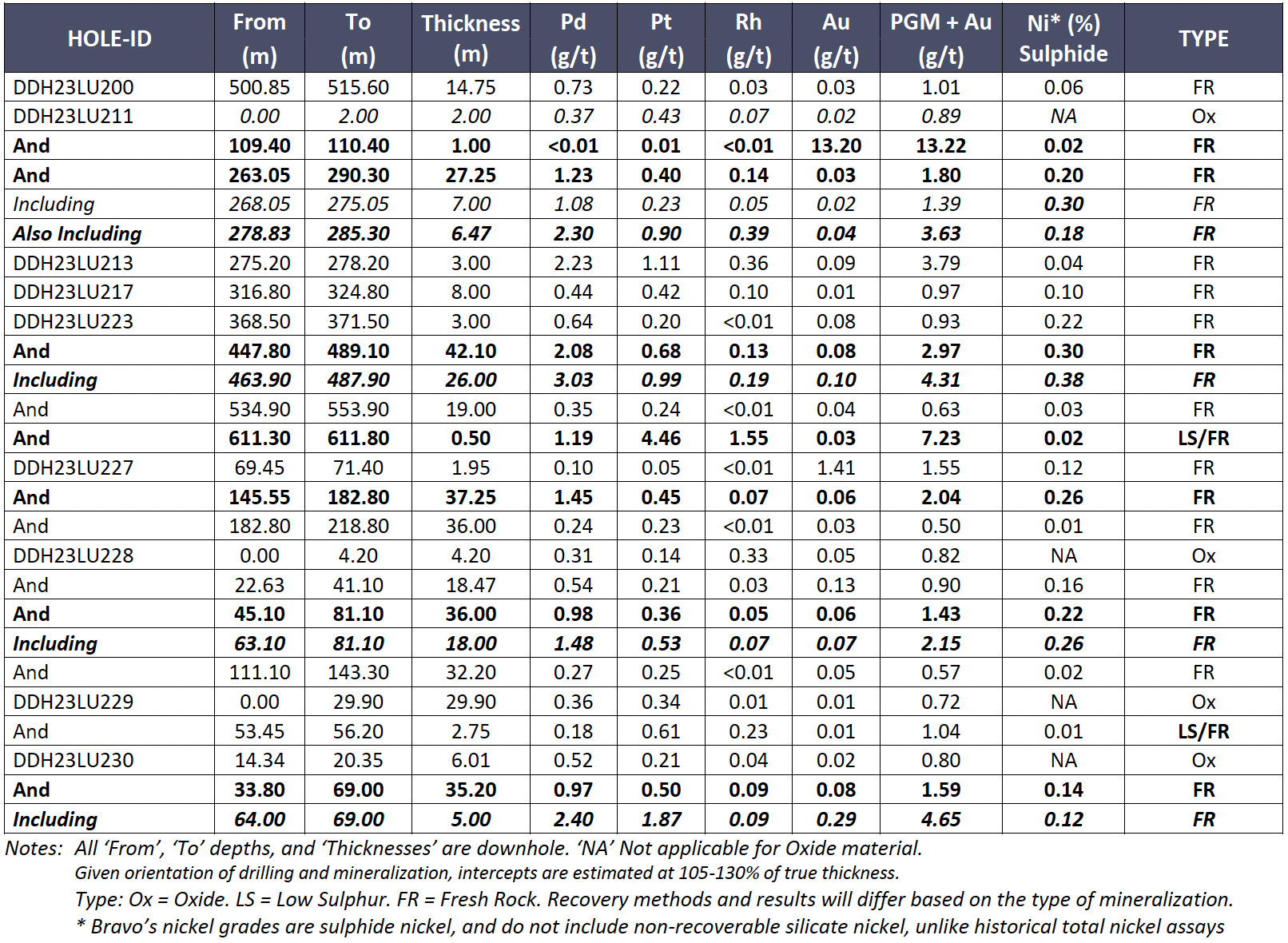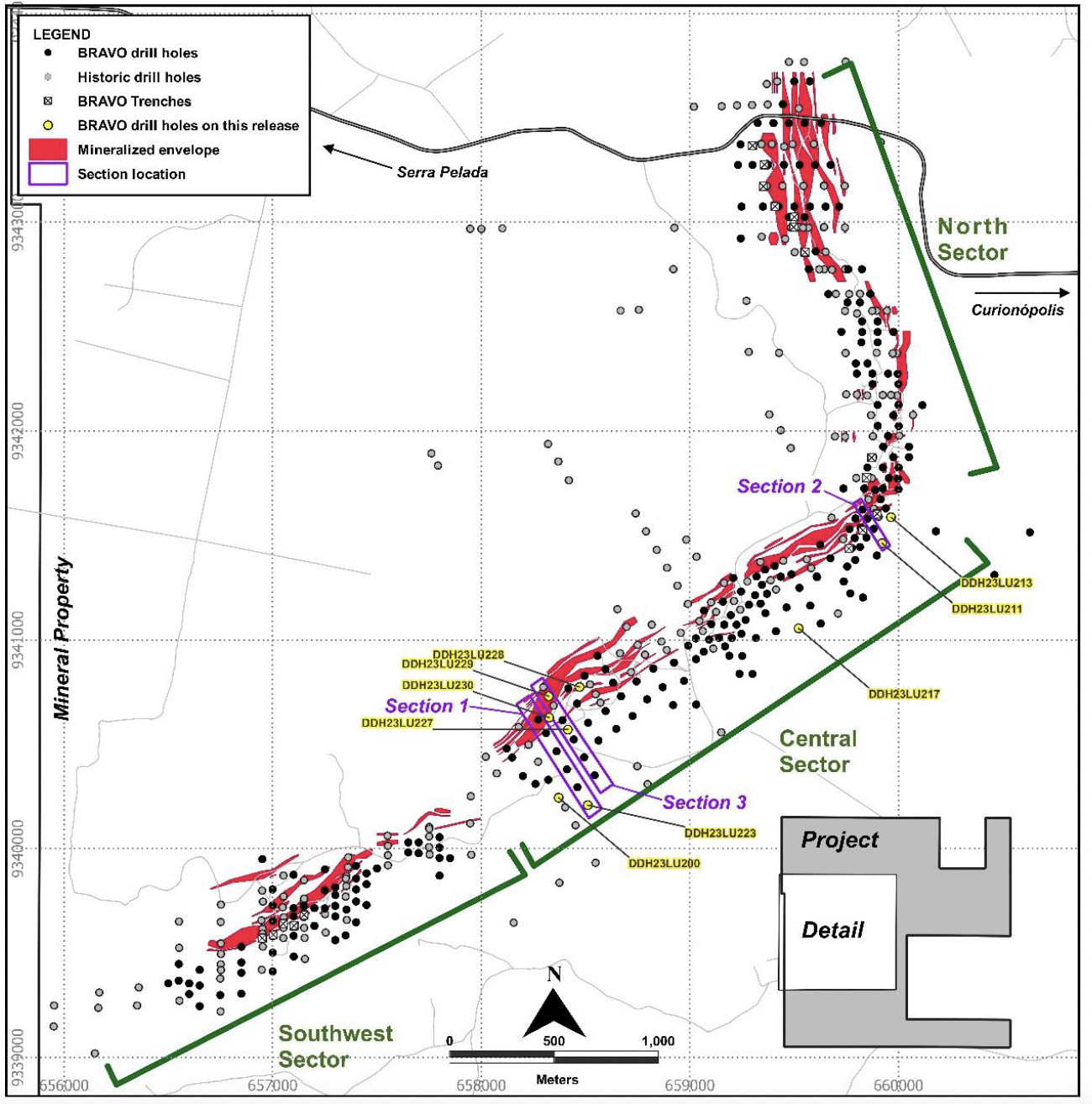Highlights include 42m at 2.97g/t PGM+Au, 0.30% Ni including 26m at 4.31g/t PGM+Au, 0.38% Ni, 37m at 2.04g/t PGM+Au, 0.26% Ni, and 27m at 1.80g/t PGM+Au, 0.20% Ni
VANCOUVER, February 13, 2024 – Bravo Mining Corp. (TSX.V: BRVO, OTCQX: BRVMF), (“Bravo” or the “Company”) announced that it has received assay results from nine diamond drill holes (“DDH”) from the Central Sector of its 100% owned Luanga palladium + platinum + rhodium + gold + nickel project (“Luanga” or “Luanga PGM+Au+Ni Project”), located in the Carajás Mineral Province, state of Pará, Brazil.
“The Phase 2 drill program has been completed as planned, with Phase 3 now well underway. Results continue to extend PGM+Au+Ni mineralization at depth, as far as ~400m below surface in the Central Sector or approximately double the typical depth of Bravo’s maiden mineral resource estimate,” said Luis Azevedo, Chairman and CEO of Bravo. “Furthermore, assay grades and mineralized thicknesses typically continue to improve at depth, as can be seen in Figure 2, indicating potential for significant resource growth.”
Highlights Include:
- Drilling in the Central Sector, such as DDH23LU223 (42m at 2.97g/t PGM+Au, 0.30% Ni including 26m at 4.31g/t PGM+Au, 0.38% Ni), extend known mineralization to approximately 400m below surface.
- Results support the potential for future growth in Luanga’s Mineral Resource Estimate (“MRE”).
- Additional drill results from the North Sector are pending.
- Trenching of near surface mineralization and testing of geophysical anomalies is underway.
Luanga Drilling Update
Results from nine diamond drill holes have been received from the Central Sector. All the drill holes herein reported are angled holes (60 to 65 degrees) towards a 330° direction. Together, this set of drill holes comprise a total of 3,001 metres of diamond drilling.
Section 1 (Figure 1) in the Central Sector shows DDH23LU223 (42m at 2.97g/t PGM+Au, 0.30% Ni including 26m at 4.31g/t PGM+Au, 0.38% Ni), which lies down dip from previously reported DDH23LU204 (49m at 3.12g/t PGM+Au, 0.33% Ni), extending known mineralization to approximately 400m below surface, or approximately double the typical depth extent of the maiden MRE announced October 22, 2023.
Figure 1: Central Sector (Section 1 on Figure 4) – Mineralization defined to approximately 400m below surface.
Section 2 (Figure 2) shows DDH23LU211 (27m at 1.80g/t PGM+Au, 0.20% Ni), drilled at the northern extent of the Central Sector to testing the potential for higher-grade zones at depth, as observed in nearby sections. Drill hole DDH23LU211 not only intersects significantly higher grade than DDH23LU117 approximately 100m above (up dip), but over a much greater width, with the added presence of nickel sulphides. Again, this bodes well for the further definition of high-grade zones and for future MRE growth.
Figure 2: Central Sector (Section 2 on Figure 4) – Mineralized widths and grades improving at depth.
Section 3 (Figure 3) shows DDH23LU215 (30m at 1.73g/t PGM+Au, 0.25% Ni), drilled on the next section north of Section 1 (Figure 1) in the Central Sector. DDH23LU215 defines the continuation of mineralization a further 100m down dip, also now reaching approximately 400m below surface, further supporting the potential for future MRE growth in the Central Sector.
Figure 3: Central Sector (Section 3 on Figure 4). Mineralization defined to approximately 400m below surface.
Drill Results Status Update
A total of 257 drill holes have been completed by Bravo to date, for 55,683.25 metres, including 8 metallurgical holes (not subject to routine assaying).
Results have been reported for 220 Bravo drill holes to date. Assay Results for 29 completed Bravo drill holes are currently outstanding (excluding the metallurgical holes).
Complete Table of Recent Intercepts.
Figure 4: Location of Bravo Drilling and Sections Reported in this News Release
About Bravo Mining Corp.
Bravo is a Canadian and Brazil-based mineral exploration and development company focused on advancing its Luanga PGM+Au+Ni Project in the world-class Carajás Mineral Province of Brazil.
The Luanga Project is situated on mature freehold farming land and benefits from being in a location close to operating mines, with excellent access and proximity to existing infrastructure, including road, rail, and clean renewable hydro grid power. A fully funded 63,000m infill, step out and exploration drilling and trenching program is well advanced for 2024. Bravo’s current Environmental, Social and Governance activities includes replanting high- value trees in the project area, hiring and contracting locally, and ensuring protection of the environment during its exploration activities.
Technical Disclosure
Technical information in this news release has been reviewed and approved by Simon Mottram, F.AusIMM (Fellow Australia Institute of Mining and Metallurgy), President of Bravo Mining Corp. who serves as the Company’s “qualified person” as defined in National Instrument 43-101 Standards of Disclosure for Mineral Projects (“NI 43-101”). Mr. Mottram has verified the technical data and opinions contained in this news release.
For further information about Bravo, please visit www.bravomining.com or contact:
Alex Penha
EVP Corporate Development
info@bravomining.com
Forward Looking Statements
This news release contains forward-looking information which is not comprised of historical facts. Forward-looking information is characterized by words such as “indicating”, “potential”, “significant”, “indicative”, “continue”, “bodes well”, variants of these words and other similar words, phrases, or statements that certain events or conditions “may” or “will” occur. This news release contains forward-looking information pertaining to the Company’s ongoing drill program and the results thereof; comparisons to historical and prior Bravo drilling; the potential for extensions to mineralization at depth; the potential for greater thicknesses and/or higher grades at depth; and the Company’s plans in respect thereof. Forward-looking information involves risks, uncertainties and other factors that could cause actual events, results, and opportunities to differ materially from those expressed or implied by such forward-looking information. Factors that could cause actual results to differ materially from such forward-looking information include, but are not limited to, unexpected results from exploration programs, changes in the state of equity and debt markets, fluctuations in commodity prices, delays in obtaining required regulatory or governmental approvals, environmental risks, limitations on insurance coverage; and other risks and uncertainties involved in the mineral exploration and development industry. Forward-looking information in this news release is based on the opinions and assumptions of management considered reasonable as of the date hereof, including, but not limited to, the assumption that the assay results confirm that the interpreted mineralization contains significant values of nickel, PGMs and Au; that the mineralization remains open to depth, that Ni grades are improving to depth; that a zone of higher grade mineralization may be present in the Central Sector; that the presence of magmatic Ni sulphides may be indicative of zones of potential economic interest; that the geophysical anomalies identified are related to mineralization of potential economic interest; that final drill and assay results will be in line with management’s expectations; that activities will not be adversely disrupted or impeded by regulatory, political, community, economic, environmental and/or healthy and safety risks; that the Luanga Project will not be materially affected by potential supply chain disruptions; and general business and economic conditions will not change in a materially adverse manner. Although the Company believes that the assumptions and factors used in preparing the forward-looking information in this news release are reasonable, undue reliance should not be placed on such information. The Company disclaims any intention or obligation to update or revise any forward-looking information, other than as required by applicable securities laws.
Schedule 1: Drill Hole Collar Details
Schedule 2: Assay Methodologies and QAQC
Samples follow a chain of custody between collection, processing, and delivery to the SGS Geosol laboratory in Parauapebas, state of Pará, Brazil. The drill core is delivered to the core shack at Bravo’s Luanga site facilities and processed by geologists who insert certified reference materials, blanks, and duplicates into the sampling sequence. Drill core is half cut and placed in secured polyurethane bags, then in security-sealed sacks before being delivered directly from the Luanga site facilities to the Parauapebas SGS Geosol laboratory by Bravo staff. Additional information about the methodology can be found on the SGS Geosol website (SGS) in their analytical guides. Information regarding preparation and analysis of historic drill core is also presented in the table below, where the information is known.
Quality Assurance and Quality Control (“QAQC”) is maintained internally at the lab through rigorous use of internal certified reference materials, blanks, and duplicates. An additional QAQC program is administered by Bravo using certified reference materials, duplicate samples and blank samples that are blindly inserted into the sample batch. If a QAQC sample returns an unacceptable value an investigation into the results is triggered and when deemed necessary, the samples that were tested in the batch with the failed QAQC sample are re-tested.

